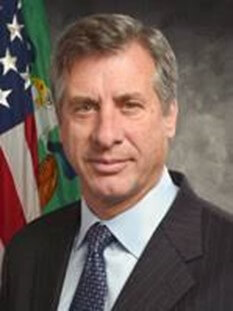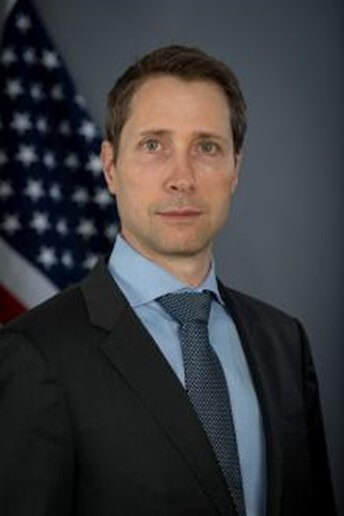Ken Phelan, who in November 2014 became the first chief risk officer of the U.S. Treasury Department, stepped down as of early February. His departure also created a vacancy at the Office of Financial Research (OFR), of which Phelan was acting director since January 2018.
While at the American Enterprise Institute on February 12, where he participated in a panel discussion on global market risks, Phelan said he had been commuting between Washington, DC, and Philadelphia and was looking forward to some extended time at home.

Over a 20-plus year period, Phelan had served in a variety of senior financial risk management and capital markets roles. He was CRO of Wachovia Corp. during the transition period of its merger with Wells Fargo & Co.; of Fannie Mae after it entered conservatorship in the wake of the financial crisis; and, from 2011 to 2014, of RBS Americas.
At Treasury, Phelan established an Office of Risk Management and, according to an official biography, provided “senior administration officials with analyses of key risks including credit, market, liquidity, operational, governance, and reputational risks across the department.” He was credited with promoting enterprise risk management principles across multiple agencies.
He was a leader among a growing community of CROs in financial supervisory agencies such as the Securities and Exchange Commission, which launched a search last year to fill the position. [For an update, see SEC Fills Key Risk Positions.]
Political Heat
The OFR directorship was more of a political hot seat. The office was authorized by the Dodd-Frank Act of 2010, concurrently with the multi-agency, Treasury-led Financial Stability Oversight Council (FSOC), to monitor threats to the stability of the financial system.
The OFR was initially organized during the Obama administration by former Wall Street economist Richard Berner, who was its presidentially-appointed permanent director from 2013 through 2017. Berner and his team parried criticisms, particularly from the Republican congressional majority, for the breadth of their data-gathering mandate and for operational issues such as cybersecurity.
At the same time, the OFR built an extensive library of research and working papers and analytical tools such as the Financial Stress Index and Financial System Vulnerabilities Monitor.
Berner, now an executive-in-residence and adjunct professor at New York University's Stern School of Business, established data-sharing relationships with regulators around the world, toward the objective of what he termed “shining a light on the dark corners of the financial system.” (See Berner to Leave Office of Financial Research)
Budget and Staff Cuts
During Phelan's time at the helm of OFR, the office underwent what its 2018 annual report describes as a “reshaping initiative” and streamlining of operations, as it “refocused its mission to primarily support the Financial Stability Oversight Council and its member agencies.”
The workforce was reduced during fiscal year 2018 to 152 from 210, and another 40 positions were cut shortly thereafter. The budget, which peaked at $94.9 million in fiscal 2016, was $75.9 million two years later.
Phelan said that acting Treasury assistant secretary for financial institutions Kipp Kranbuhl will be taking over his OFR duties. President Donald Trump last year nominated Dino Falaschetti to be permanent OFR director, but he has not been confirmed by the Senate.
Falaschetti, currently senior adviser-domestic finance at Treasury, was chief economist of the House Financial Services Committee during the chairmanship of Jeb Hensarling, Republican of Texas and an outspoken critic of the FSOC and OFR.
Bauguess Leaves DERA
Another prominent member of the capital's financial-risk-and-analytics community, Scott Bauguess, announced in December that he planned to leave the Securities and Exchange Commission after more than 11 years of service.

Bauguess was deputy director since 2013 of the SEC's Division of Economic and Risk Analysis (DERA) and deputy chief economist. In 2017 he was the division's acting director (a title currently held by Chyhe Becker).
According to a press release, Bauguess “led all of the economic analyses of rules implementing provisions of the JOBS Act and critical components of the Dodd-Frank Act, participated in the development of disclosure technologies related to registrant reporting, and oversaw the introduction of new and innovative data analytical methods and programs employing artificial intelligence technology to assist SEC staff in their supervisory and investigative activities.”
Among other contributions listed: He was SEC representative to the Financial Stability Board's Standing Committee on Assessing Vulnerabilities (SCAV) and Analytical Group on Vulnerabilities (AGV); oversaw the establishment of DERA's Office of Research and Data Services and Office of Risk Assessment; and “developed programs that leverage machine learning and natural language processing of narrative disclosures in SEC filings to develop novel analytical insights in support of market supervision activities.”
“Scott has long been a champion of using of data-driven methods to support our enforcement program,” said Stephanie Avakian, co-director of the agency's Division of Enforcement. “He has tremendous insight on how to leverage advanced analytics to identify potential securities law violations, and we will miss collaborating with him.”
GARP editor-in-chief Jeffrey Kutler contributed to this article.